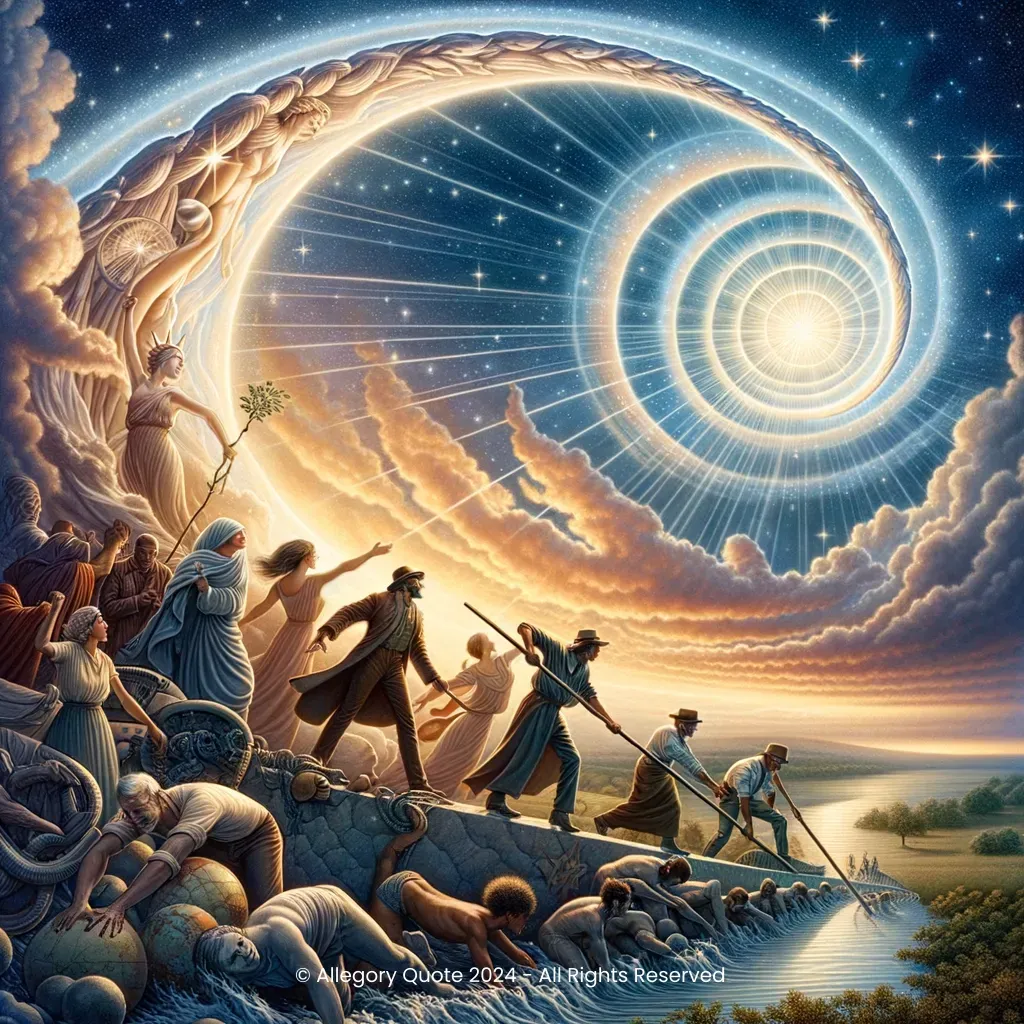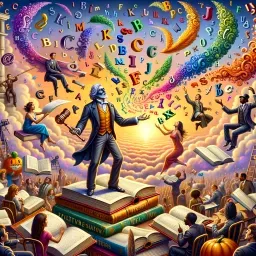”The arc of the moral universe is long,
but it bends toward justice“

0
0
0
0
- Meaning
- This phrase suggests that the struggle for justice may be lengthy and arduous, but ultimately, justice will prevail. It propounds an optimistic view that despite setbacks and delays, the steady pursuit of justice will lead to a morally righteous outcome. The phrase encourages patience and perseverance, implying that ethical and just principles are ingrained in the fabric of the universe.
- Allegory
- The celestial arc symbolizes the long and often arduous path toward justice, representing the moral universe. The radiant, glowing path in the sky signifies hope and the certainty of eventual justice. The distant, brilliant light represents ultimate justice, the endpoint of this moral journey. The diverse scenes of struggle and progress beneath – individuals planting trees, raising flags, or breaking chains – capture the continuous efforts and varied paths humans take toward achieving justice. Diverse figures emphasize that the struggle for justice is a universal human experience. The hopeful and uplifting tone of the image underscores the message that persistence and endurance eventually lead to moral righteousness. This visual narrative aims to inspire continued commitment to justice and ethical principles, reflecting the essence of the phrase.
- Applicability
- In our personal lives, this phrase can serve as a reminder to remain steadfast and hopeful in the face of challenges and injustices. It can inspire individuals to continue advocating for what is right, even when immediate results are not visible. For organizations and societies, it reinforces the importance of maintaining ethical standards and pushing for systemic changes even when progress seems slow.
- Impact
- King’s use of the phrase became a rallying cry for the civil rights movement, linking the slow but steady progress towards justice to a larger, almost cosmic certainty. It has been cited in countless speeches, writings, and protests over the decades, reinforcing the resilience needed to combat racial injustice and other societal inequities.
- Historical Context
- The original sentiment was penned by Theodore Parker in the mid-19th century, a period rife with social reform movements, including the fight against slavery in the United States. Parker's complete quote was: "I do not pretend to understand the moral universe; the arc is a long one, my eye reaches but little ways; I cannot calculate the curve and complete the figure by experience of sight; I can divine it by conscience. And from what I see I am sure it bends toward justice."
- Criticisms
- Critics may argue that the phrase could foster complacency, suggesting that justice will eventually prevail without active effort. This interpretation can undermine the urgency required in addressing injustices immediately. Furthermore, some might say that not everyone can afford to wait for justice to prevail "eventually," as ongoing injustices cause real, present harm.
- Variations
- There are various contemporary and cultural interpretations of this phrase. Different cultures might adapt it to resonate with their own struggles for justice. For instance, in various movements for human rights and equality across the globe, this statement could be translated and embraced as part of a universal message of hope and perseverance.
-

The true test of a man's honor is his loyalty to his country.
-

You are entitled to your own opinions, but not your own facts.
-

Success is not final, failure is not fatal: It is the courage to continue that counts.
-

A good reputation is more valuable than money.
-

I don't give a damn for a man that can only spell a word one way.
-

Wrinkles should merely indicate where smiles have been.
-

I have not yet begun to fight!
-

Good things come to those who wait.
-

In any moment of decision, the best thing you can do is the right thing, the next best thing is the wrong thing, and the worst thing you can do is nothing.
-

Well-behaved women seldom make history.
-

That government is best which governs least.
-

A foolish consistency is the hobgoblin of little minds.
No Comments